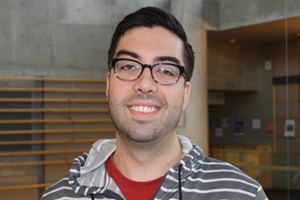UOIT Software Engineering graduate receives prestigious Carnegie Mellon scholarship
April 8, 2014

When a global research university calls with an offer of a full graduate school scholarship, you certainly know you have made the grade.
Shortly after University of Ontario Institute of Technology (UOIT) student Daniel Smullen crosses the stage at Convocation on June 5 to collect his Bachelor of Engineering degree in Software Engineering, he will continue his educational journey at one of the top U.S. universities for computer science. Smullen’s success at UOIT has led to a full PhD Software Engineering scholarship at the Carnegie Mellon University's (CMU) Institute for Software Research (ISR) in Pittsburgh, Pennsylvania.
“Because of their personal commitment to their students' success, my professors helped me make the most out of my four years at UOIT,” said Smullen. “UOIT's project-oriented Software Engineering program was a compass for how I should navigate my career, and now move on to doctorate-level research at a top research university.”
“Daniel certainly made the most of the University of Ontario Institute of Technology’s approach, which provides for hands-on, undergraduate research opportunities for upper-year students,” said. Dr. Tarlochan Sidhu, Dean, FEAS. “The positive co-operation between FEAS and the Faculty of Science is an excellent example of the powerful impact of interdisciplinary collaborations at UOIT."
Smullen credits the support of researchers like the Faculty of Engineering and Applied Science’s (FEAS) Dr. Ramiro Liscano, Dr. Shahryar Rahnamayan, and Dr. Kamran Sartipi; and Dr. Jeremy Bradbury of the Faculty of Science (FSCI).
“Daniel is an excellent student who has both the ability and desire to not only succeed, but to excel as a graduate student,” said Dr. Bradbury, who runs FSCI’s Software Quality Research Lab. “He has demonstrated a natural acumen for problem solving and shown great initiative with respect to his work.”
“Daniel was one of our top Software Engineering students, and together with two other students (Jonathan Gillett and Joseph Heron) he collaborated with the Ontario Ministry of Transportation and the University of Toronto on an innovative capstone project to analyze traffic camera data,” said Dr. Shahryar Rahnamayan, FEAS. “Their novel system using 80 cameras actively recognizes and classifies road conditions (including accidents) and hazards, while passively capturing traffic statistics and other metrics. We are planning to protect it as intellectual property.”
The resulting research paper by Smullen, Gillett and Heron from their Artificial Intelligence course has been accepted for publication in the IEEE’s 2014 World Congress on Computational Intelligence, one of the top conferences in the soft computing area.



